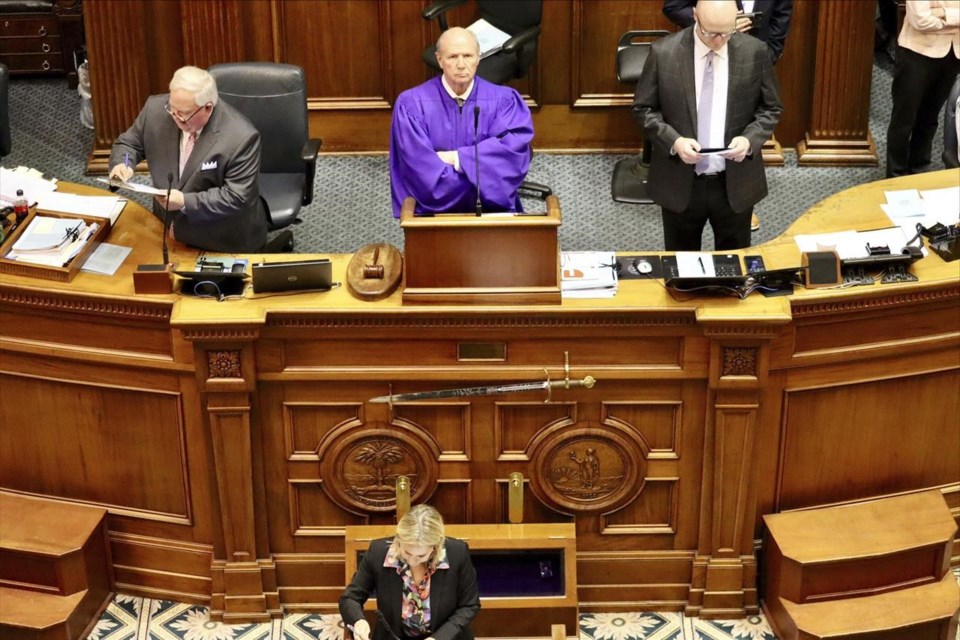COLUMBIA, S.C. (AP) — South Carolina senators rejected a bill that would have banned nearly all abortions in a conservative state that has increasingly served patients across a region where Republican officials have otherwise curtailed access.
A 22-21 vote Thursday marks the third time a near-total abortion ban has failed in the Republican-led chamber since the U.S. Supreme Court reversed Roe v. Wade last summer. Six Republicans helped block motions to end debate and defeated any chance the bill passes this year.
The chamber’s five women filibustered the proposal in speeches highlighting the Senate’s male majority that they criticized for pushing debates on abortion over other pressing issues.
Republican Sen. Penry Gustafson spent over 30 minutes Wednesday detailing the bodily changes throughout every stage of pregnancy. Gustafson said she spoke so long because the millions of women addressed in the bill had not been heard. She emphasized her “pro-life” position but said the proposal left “no room for empathy, reality or graciousness.”
Republican Sen. Sandy Senn criticized Majority Leader Shane Massey for repeatedly “taking us off a cliff on abortion.”
“The only thing that we can do when you all, you men in the chamber, metaphorically keep slapping women by raising abortion again and again and again, is for us to slap you back with our words,” Senn said.
The bill would have banned abortion at conception, with exceptions for rape or incest through the first trimester, fatal fetal anomalies confirmed by two physicians, and to save the patient’s life or health.
Independent Sen. Mia McLeod criticized leaders who prioritized the near-total ban over efforts to make South Carolina the 49th state in the country with a law allowing harsher punishments for violent hate crimes.
McLeod, who shared during a previous abortion debate that she had been raped, said it is unfortunate that women must reveal intimate experiences to “enlighten and engage” men.
“Just as rape is about power and control, so is this total ban,” McLeod said Thursday. “Those who continue to push legislation like this are raping us again with their indifference, violating us again with their righteous indignation, taunting us again with their insatiable need to play God while they continue to pass laws that are ungodly.”
Abortion remains legal through 22 weeks in South Carolina — a status that has drawn patients throughout the increasingly restrictive Southeast.
The number of abortions and out-of-state patients has risen since the South Carolina Supreme Court first enjoined and then struck down a 2021 law, according to provisional state health department data that could change.
Supporters said the bill is necessary to curb those trends. Opponents said it would only prevent safe access to the procedure and worsen the state’s already alarmingly high maternal death rates and even poorer outcomes for Black patients.
The vote maintains the legislative stalemate made plain during a special session last year when the House and Senate failed to agree on when South Carolina should ban abortion. The Senate has again passed a different ban taking effect when cardiac activity is detected, as early as six weeks and before many people realize they are pregnant.
The developments have astounded the staunchest anti-abortion lawmakers in a General Assembly that previously led the way on regulations like a law requiring physicians to inform patients that they can see an ultrasound before the procedure.
Republican Sen. Richard Cash began Wednesday’s debate by expressing disappointment that a majority party that has long waved the “pro-life” banner would not pass a total abortion ban.
“I’m not willing to sit by and let the goalposts be moved for what it means to be pro-life for the Republican Party,” Cash said.
Massey said Thursday's vote shows that the House must consider the Senate bill to give lawmakers a shot at passing new restrictions by the time session ends on May 11.
House Speaker Murrell Smith would not commit to voting on the Senate bill but told reporters Wednesday that the House “is always going to evaluate its options on protecting life.”
Republican Gov. Henry McMaster on Wednesday urged lawmakers to pass a bill that “the vast majority of our state” finds acceptable. He later clarified that he thinks most people supported a 2021 law banning abortion when cardiac activity is detected — which the state’s highest court ruled unconstitutional, and which resembles the Senate version.
—-
Associated Press writer Jeffrey Collins contributed to this report. James Pollard is a corps member for the Associated Press/Report for America Statehouse News Initiative. Report for America is a nonprofit national service program that places journalists in local newsrooms to report on undercovered issues.
James Pollard, The Associated Press



